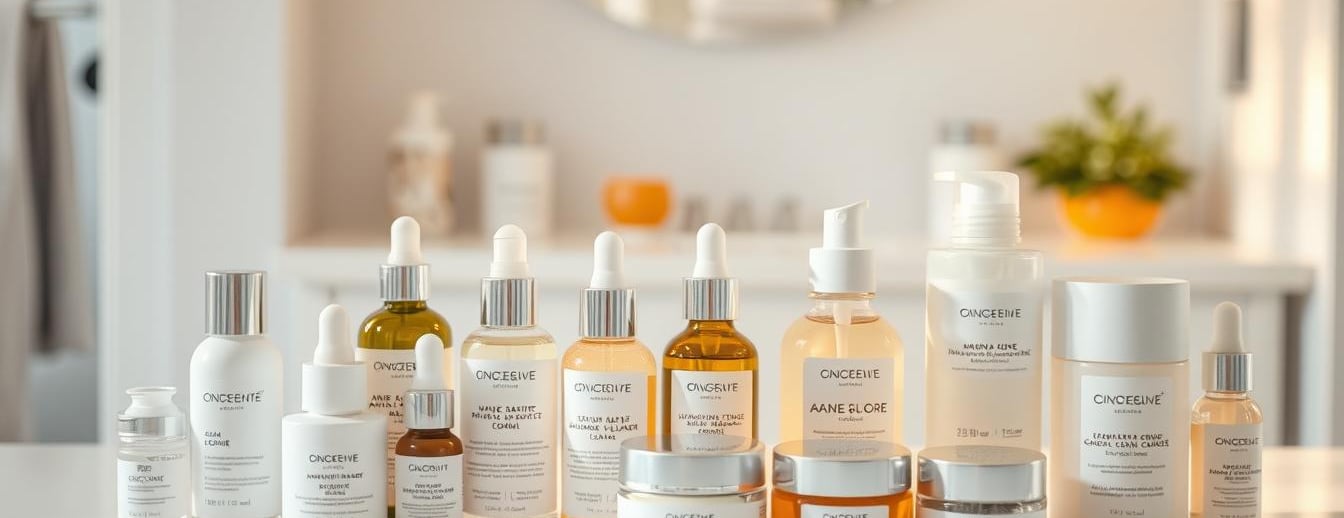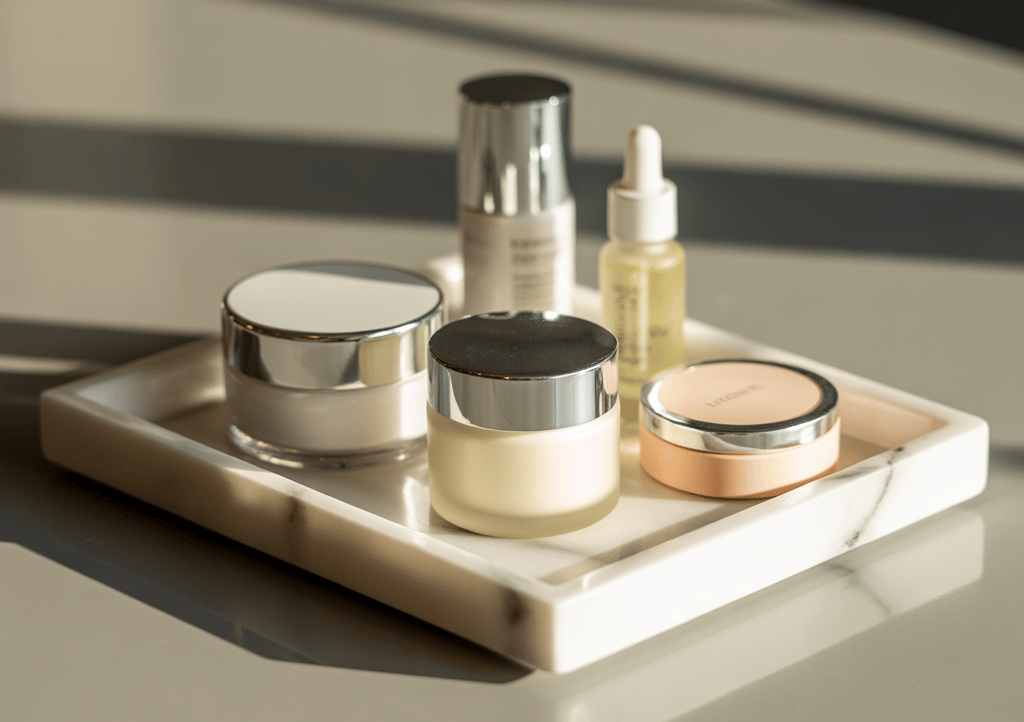Acne Solutions for Clear, Confident Skin
At Belle Rich Life, we believe clear skin is the foundation of beauty and confidence. Acne is more than a skincare concern — it can impact self-esteem and daily life. That’s why we curate effective acne solutions that blend luxury with science, offering routines and products designed to target breakouts, soothe irritation, and restore balance. From gentle cleansers to advanced treatments, explore how to achieve radiant, blemish-free skin while embracing a lifestyle of elegance and self-care.
Acne Skincare Routine: Your Guide to Flawless Skin
Achieving flawless skin is a goal for many, and a well-crafted acne skincare routine is the first step towards making it a reality. With the right approach, you can say goodbye to acne and hello to a radiant complexion.
Having a proper routine in place helps to control acne, reduce inflammation, and prevent future breakouts. In this article, we'll explore the essential steps to creating an effective acne skincare routine that works for you.
Key Takeaways
Understand your skin type to create a personalized skincare routine
Learn how to choose the right products for acne-prone skin
Discover the importance of consistency in your skincare routine
Find out how to adjust your routine according to your skin's needs
Explore the role of lifestyle changes in managing acne
Understanding Acne: Causes and Types
Understanding acne is crucial for developing an effective skincare routine, as it is a condition influenced by a multitude of factors including genetics, environment, and lifestyle. Acne is not just a cosmetic issue; it's a complex condition that requires a comprehensive approach to manage.
The Science Behind Breakouts
Acne occurs when the pores on the skin become clogged with dead skin cells, oil, and bacteria. This blockage leads to inflammation, which can cause redness, swelling, and sometimes pus-filled pimples. The primary cause of acne is the overproduction of sebum, an oily substance produced by the sebaceous glands.
Different Types of Acne
There are several types of acne, including:
Whiteheads: Small, white bumps that occur when pores are completely blocked.
Blackheads: Small, dark spots that appear when pores are partially blocked.
Inflammatory Acne: Red, swollen pimples that can be painful.
Cystic Acne: Large, painful cysts that can lead to scarring.
Identifying Your Acne Triggers
Identifying what triggers your acne is key to managing it. Common triggers include hormonal changes, certain medications, stress, and the use of inappropriate skincare products. Keeping a skincare diary can help you track when breakouts occur and what might have caused them. By understanding the causes and types of acne, you can begin to develop a personalized acne treatment regimen that addresses your specific skin concerns.
Building an Effective Acne Skincare Routine
Creating an effective acne skincare routine requires a comprehensive understanding of your skin type and its specific needs. A well-crafted routine can help control acne, reduce inflammation, and prevent future breakouts.
Core Principles for Acne-Prone Skin
For acne-prone skin, it's essential to focus on gentle, non-comedogenic products that won't clog pores. Salicylic acid and benzoyl peroxide are key ingredients that help to exfoliate the skin, unclog pores, and reduce acne-causing bacteria.
Principle: Gentle Cleansing. Description: Use a mild cleanser that effectively removes dirt, without stripping the skin of its natural oils. Benefit: Reduces irritation and inflammation.
Principle: Exfoliation. Description: Regular exfoliation helps remove dead skin cells and unclog pores. Benefit: Improves skin texture and reduces acne.
Principle: Product Selection. Description: Choose products labeled "non-comedogenic" or "oil free" to minimize pore clogging. Benefit: Reduces the risk of comedones and acne.
Consistency is Key
Consistency is crucial when it comes to an acne skincare routine. Sticking to your routine morning and night can help to regulate your skin and reduce acne. It's also important to be patient, as it can take some time to see results.
Patch Testing New Products
Before introducing new products into your routine, patch testing is essential to check for any adverse reactions. Apply a small amount of the product to a discreet area of your skin and wait 24-48 hours to assess any reactions.
Adjusting Your Routine Seasonally
Your skin's needs can change with the seasons. In the summer, you may need to switch to lighter products to avoid clogging pores, while in the winter, you may need to moisturize more to combat dryness. Adjusting your routine seasonally can help keep your skin balanced.
Morning Acne Skincare Routine Steps
Starting your day with a well-structured morning acne skincare routine can make all the difference in achieving clear, healthy-looking skin. A consistent morning routine helps control acne by removing overnight impurities and preparing your skin for the day ahead.
Gentle Cleansing Techniques
The first step in any morning acne skincare routine is gentle cleansing. Use a mild, non-comedogenic cleanser that effectively removes dirt and oil without stripping the skin of its natural moisture. Massage the cleanser onto your damp face for about 30 seconds, then rinse with lukewarm water, finishing with a splash of cool water to close the pores.

Toning and Balancing pH Levels
After cleansing, apply a toner to help balance your skin's pH levels and remove any remaining impurities. Look for a toner that contains witch hazel or tea tree oil, which have natural astringent and antibacterial properties. Soak a cotton pad with toner and gently sweep it across your face, avoiding the delicate skin around your eyes.
Daytime Treatment Products
Next, apply a daytime treatment product containing ingredients like salicylic acid or benzoyl peroxide, which help to control acne and prevent future breakouts. These products can help to unclog pores and reduce inflammation, making them an essential part of your morning acne skincare routine.
Non-Comedogenic Moisturizers
Even if you have oily skin, it's crucial to moisturize to keep your skin hydrated and balanced. Choose a non-comedogenic moisturizer that won't clog your pores. These moisturizers are formulated to provide hydration without exacerbating acne.
Sunscreen for Acne-Prone Skin
Finally, apply a broad-spectrum sunscreen with an SPF of at least 30. For acne-prone skin, look for sunscreens labeled "non-comedogenic" or "oil-free" to avoid clogging pores. Sunscreen is essential for preventing hyperpigmentation and further skin damage.
By following these morning acne skincare routine steps, you can help to clear acne fast and maintain healthy, resilient skin throughout the day.
Evening Acne Skincare Routine
An evening acne skincare routine is not just a necessity; it's an opportunity to repair and rejuvenate your skin. As we progress through the day, our skin accumulates dirt, oil, and makeup, which can clog pores and exacerbate acne. A well-structured evening routine helps in removing these impurities and applying treatments that work overnight to improve skin health.
Double Cleansing Method
Double cleansing is a highly effective technique for removing dirt and makeup without stripping the skin of its natural oils. It involves using an oil-based cleanser followed by a water-based cleanser. The oil-based cleanser dissolves makeup and excess sebum, while the water-based cleanser deep cleans the pores.
Exfoliation Strategies and Frequency
Exfoliation is crucial for removing dead skin cells and unclogging pores. However, it's essential to strike the right balance. Over-exfoliating can lead to irritation, while under-exfoliating may not effectively prevent breakouts. For most skin types, exfoliating 2-3 times a week is sufficient. Choose a gentle exfoliant containing alpha-hydroxy acids (AHAs) or beta-hydroxy acids (BHAs) to help manage acne.
Targeted Nighttime Treatments
Nighttime is ideal for applying targeted treatments that address specific skin concerns, such as acne, hyperpigmentation, or fine lines. Products containing retinoids or salicylic acid are particularly effective for acne-prone skin, as they help prevent clogged pores and reduce inflammation.
Overnight Healing Products
Overnight healing products, such as moisturizers and serums, play a vital role in hydrating the skin and supporting its natural repair processes. Look for products labeled "non-comedogenic" or "oil-free" to avoid clogging pores. Ingredients like hyaluronic acid and niacinamide can help soothe and repair the skin while you sleep.
Essential Ingredients for Fighting Acne
To tackle acne, understanding the essential ingredients for acne treatment is crucial for developing an effective skincare routine. These ingredients are the backbone of any successful acne prevention routine. By incorporating the right products with proven ingredients, you can significantly improve your chances of achieving clear skin.
Salicylic Acid Benefits and Usage
Salicylic acid is a beta-hydroxy acid that exfoliates the skin, unclogs pores, and reduces inflammation. It's particularly effective for blackheads and whiteheads. When using salicylic acid, start with a lower concentration (around 0.5%) to gauge your skin's sensitivity.
Benzoyl Peroxide Application Tips
Benzoyl peroxide is a powerful ingredient that kills bacteria causing acne. It's available in various concentrations (2.5%, 5%, or 10%). Begin with a lower concentration to minimize irritation, and apply it as a spot treatment or all over the face.
Retinoids and Vitamin A Derivatives
Retinoids, derived from vitamin A, promote cell turnover, prevent clogged pores, and reduce inflammation. They can be irritating, so start with a low concentration and gradually increase as your skin becomes more tolerant.
Niacinamide, AHAs, and Supporting Ingredients
Niacinamide improves skin's elasticity, reduces inflammation, and enhances the skin's barrier function. Alpha-hydroxy acids (AHAs) like glycolic acid and lactic acid exfoliate the skin and promote brightness. These ingredients can be used in combination with other acne-fighting ingredients for enhanced benefits.
Ingredient Combinations to Avoid
While combining ingredients can be beneficial, some combinations can irritate the skin or reduce their effectiveness. For example, using benzoyl peroxide and retinoids together can be too harsh; consider alternating days or using them at different times of the day.
Best Acne Skincare Products for Different Skin Types
Understanding your skin type is crucial in choosing the most effective acne skincare products. With a myriad of options available, it's essential to identify products that cater to your specific skin needs, whether you have oily, dry, combination, or sensitive skin.




Products for Oily, Acne-Prone Skin
For oily skin, look for products labeled "non-comedogenic" or "oil-free" as they are less likely to clog pores. Salicylic acid and benzoyl peroxide are effective ingredients in controlling acne. Products containing tea tree oil can also help due to their natural antibacterial properties.
Solutions for Dry, Acne-Prone Skin
Dry, acne-prone skin requires gentle, hydrating products that won't strip the skin of its natural oils. Look for moisturizers with hyaluronic acid and soothing ingredients like aloe vera. Avoid harsh exfoliants and opt for gentle, chemical-based exfoliants instead.
Combination Skin Approaches
For combination skin, balancing between controlling acne in oily areas and hydrating dry areas is key. Using a lightweight, non-comedogenic moisturizer and applying spot treatments containing salicylic acid or benzoyl peroxide can help manage acne without drying out the skin.
Sensitive Skin Considerations
If you have sensitive skin, it's crucial to choose acne skincare products for sensitive skin that are fragrance-free and hypoallergenic. Products with soothing ingredients like niacinamide can help reduce inflammation without irritating the skin.
Budget-Friendly Product Options
Effective acne skincare doesn't have to be expensive. Look for budget-friendly options that contain proven acne-fighting ingredients. Drugstore brands often offer affordable alternatives to high-end products without compromising on efficacy.
Common Mistakes in Your Acne Skincare Routine
Understanding the common pitfalls in acne skincare can be the key to unlocking a clearer complexion. Many people unintentionally make mistakes that can exacerbate their acne, making it essential to identify and correct these errors.
Over-Cleansing and Stripping the Skin
Over-cleansing can strip the skin of its natural oils, leading to increased oil production and potentially more acne. Gentle cleansing is crucial to maintaining a balanced skin environment.
Using Too Many Active Ingredients
Using too many active ingredients can irritate the skin, causing more harm than good. It's essential to introduce products gradually and monitor the skin's response.
Common Mistake: Over-Cleasing. Consequence: Rips natural oils, potentially increasing oil production. Correction: Use gentle cleansers and limit cleansing to twice a day.
Common Mistake: Using Too Many Active Ingredients. Consequence: Irritate the skin, potentially causing more acne. Correction: Introduce products one at a time and monitor skin response.
Common Mistake: Skipping Moisturizer. Consequence: Can lead to dryness and irritation, potentially exacerbating acne. Correction: Use a non-comedogenic moisturizer daily.
Skipping Moisturizer
Skipping moisturizer can lead to dryness and irritation, potentially exacerbating acne. Using a non-comedogenic moisturizer daily can help maintain the skin's barrier function.
Picking and Popping Pimples
Picking and popping pimples can lead to infection, scarring, and prolonged healing times. It's crucial to resist the temptation and allow pimples to heal naturally or with professional help.
Inconsistent Product Use
Inconsistent product use can lead to ineffective treatment and prolonged acne issues. Establishing a consistent acne skincare routine is vital for achieving and maintaining clear skin.
Lifestyle Factors That Impact Your Acne
To tackle acne effectively, it's essential to look beyond skincare products and consider how your lifestyle is impacting your skin. While a good skincare routine is crucial, lifestyle factors play a significant role in determining the health of your skin.
Diet and Acne Connection
Diet is a critical factor that can influence acne. Consuming foods high in sugar, dairy, and refined carbohydrates can trigger or worsen acne. "A diet rich in whole foods, fruits, and vegetables can help support skin health," says a dermatology expert. Incorporating foods with omega-3 fatty acids, zinc, and antioxidants can be particularly beneficial.
Stress Management Techniques
Stress is another significant factor that can impact acne. High stress levels can increase the production of hormones like cortisol, which can lead to breakouts. Practicing stress management techniques such as meditation, yoga, or deep breathing exercises can help mitigate this effect.
Sleep Quality Improvement
Getting adequate sleep is vital for overall health, including skin health. Poor sleep quality can lead to inflammation and stress, both of which can exacerbate acne. Establishing a consistent sleep schedule and creating a relaxing bedtime routine can improve sleep quality.
Exercise and Sweat Management
Regular exercise is beneficial for overall health and can help reduce stress. However, it's essential to manage sweat properly to prevent clogged pores. Showering after exercising and wearing breathable clothing can help.
Phone and Pillowcase Hygiene
Simple hygiene practices, such as regularly cleaning your phone screen and changing your pillowcase, can reduce the transfer of bacteria to your face, thereby reducing the risk of acne.
By making these lifestyle adjustments, you can complement your acne skincare routine and improve your overall skin health. Remember, consistency is key to seeing positive changes.
Professional Treatments to Complement Your Acne Skincare Routine
For those struggling with persistent acne, incorporating professional treatments into your skincare routine for acne-prone skin can be a game-changer. While a consistent at-home routine is crucial, professional interventions can offer targeted solutions to enhance your acne treatment regimen.


Dermatologist-Prescribed Medications
Dermatologists can prescribe medications tailored to your specific acne type and severity. These may include antibiotics, retinoids, or hormonal treatments. Such medications can be more effective than over-the-counter products, especially for severe or persistent acne.
In-Office Procedures and Treatments
In-office procedures can provide immediate and often dramatic improvements. Common treatments include chemical peels, microdermabrasion, and laser therapy. These procedures can help reduce acne, prevent scarring, and improve skin texture.
When to Seek Professional Help
If your acne persists despite a consistent skincare routine, or if it's severe and causing emotional distress, it's time to seek professional help. A dermatologist can assess your skin and recommend appropriate treatments.
Insurance Coverage for Acne Treatments
Many insurance plans cover dermatologist-prescribed treatments for acne, especially if deemed medically necessary. It's essential to check with your insurance provider to understand what is covered under your plan.
By combining professional treatments with a well-crafted at-home skincare routine for acne-prone skin, you can achieve clearer, healthier skin more effectively.
Natural and DIY Remedies for Acne-Prone Skin
For those seeking a more holistic approach to managing acne, natural and DIY remedies can be a valuable addition to their skincare routine. These remedies often utilize ingredients that are easily available and can be tailored to individual skin types.
Evidence-Based Natural Ingredients
Some natural ingredients have shown promise in combating acne. For instance, tea tree oil is known for its antimicrobial properties, which can help reduce acne-causing bacteria. Aloe vera is another ingredient that can soothe irritated skin and reduce inflammation. As noted by skincare experts, "The anti-inflammatory properties of aloe vera make it an excellent ingredient for calming acne-prone skin."
Simple DIY Masks and Spot Treatments
Creating DIY masks and spot treatments can be an effective way to target acne. A simple mask made from honey and oatmeal can provide moisturizing and soothing benefits. For spot treatments, applying a dab of benzoyl peroxide or salicylic acid can help dry out pimples.
What to Avoid in Natural Remedies
While natural remedies can be beneficial, it's crucial to avoid using harsh or unproven ingredients that can irritate the skin or cause allergic reactions. Always patch test new ingredients and start with small amounts.
Complementing Commercial Products with Natural Solutions
Natural remedies can complement commercial acne skincare products, especially for sensitive skin. By incorporating natural ingredients into your routine, you can potentially reduce the risk of irritation associated with some commercial products. For teens, a simple acne skincare routine that includes gentle, non-comedogenic products and natural remedies can be particularly effective.
Special Acne Skincare Routines for Different Needs
Understanding the unique needs of different skin types and conditions is crucial for effective acne management. Acne affects individuals across various life stages and skin types, making it essential to tailor skincare routines accordingly.
Teenage Acne Approaches
For teenagers, acne skincare routines should focus on gentle, non-comedogenic products that won't clog pores. "Starting with a simple, consistent routine can significantly improve acne-prone skin," says dermatology experts. Teenagers should use products containing salicylic acid or benzoyl peroxide, which help control acne without excessive dryness.
Hormonal Acne Solutions
Hormonal acne requires a different approach, often involving products that regulate hormonal imbalances. Ingredients like niacinamide can help reduce inflammation and improve skin's barrier function.
Adult Acne Considerations
Adults with acne should consider using products that address both acne and signs of aging, such as retinoids. Consistency is key, and combining skincare with lifestyle changes can enhance results.
Post-Acne Scarring Treatment
For post-acne scarring, treatments like chemical peels or laser therapy can be effective. Using products with vitamin C and silicone can also help reduce the appearance of scars.
Acne During Pregnancy
During pregnancy, it's crucial to use safe, gentle products. Ingredients like glycolic acid are generally considered safe, but it's always best to consult with a healthcare provider.
By tailoring acne skincare routines to individual needs, individuals can more effectively manage acne and achieve healthier, clearer skin.
Conclusion: Building Your Personalized Acne-Fighting Regimen
Creating an effective acne skincare routine requires patience, consistency, and a tailored approach. By understanding your skin type, identifying your acne triggers, and selecting the right products, you can develop a skincare routine that works for you.
A well-crafted acne skincare routine should include a gentle cleanser, a toner to balance pH levels, and treatment products containing salicylic acid or benzoyl peroxide. Don't forget to moisturize and protect your skin from the sun with a non-comedogenic sunscreen.
To achieve flawless skin, it's essential to be consistent with your skincare routine for acne prone skin. Avoid common mistakes like over-cleansing, using too many active ingredients, and skipping moisturizer. By following these guidelines and staying committed to your routine, you can say goodbye to acne and hello to radiant, healthy-looking skin.
Start building your personalized acne-fighting regimen today and take the first step towards achieving the clear, glowing skin you deserve.
FAQ
What is the best acne skincare routine for sensitive skin?
For sensitive skin, it's essential to use gentle, fragrance-free products that are labeled non-comedogenic or oil-free. Start with a simple routine that includes a mild cleanser, a toner, and a spot treatment containing salicylic acid or benzoyl peroxide. Be sure to patch test any new products to ensure you don't have any adverse reactions.
How often should I exfoliate my acne-prone skin?
Exfoliating too frequently can irritate acne-prone skin, while not exfoliating enough can lead to clogged pores. Start with a gentle exfoliant containing alpha-hydroxy acids (AHAs) or beta-hydroxy acids (BHAs) one to three times a week, and adjust as needed based on your skin's response.
Can I use multiple acne treatments at once?
Using multiple acne treatments can be beneficial, but it's crucial to be cautious. Combining products with different active ingredients, such as salicylic acid and benzoyl peroxide, can be effective. However, be aware of the potential for irritation and start with a small patch test to ensure you can tolerate the combination.
How long does it take to see results from an acne skincare routine?
It can take several weeks to a few months to see noticeable improvements in your skin. Be patient and consistent with your routine, and don't be discouraged if you don't see immediate results. Factors like skin type, the severity of acne, and product effectiveness can influence the timeframe for seeing results.
Are natural remedies effective for treating acne?
Some natural ingredients, such as tea tree oil and aloe vera, have shown promise in reducing acne. However, it's essential to remember that natural doesn't always mean safe or effective for everyone. Always patch test and consult with a dermatologist before adding new products to your routine.
What are the best acne skincare products for teenage skin?
Teenagers can benefit from using products containing salicylic acid, benzoyl peroxide, or sulfur. Look for gentle, non-comedogenic cleansers and moisturizers, and consider products labeled "for acne-prone skin" or "for sensitive skin." Some popular options include products from Neutrogena, CeraVe, and Paula's Choice.
Can I wear makeup if I have acne-prone skin?
Yes, you can wear makeup if you have acne-prone skin, but choose products carefully. Opt for non-comedogenic or oil-free makeup products, and remove your makeup thoroughly at the end of the day. Look for products labeled "non-acnegenic" or "hypoallergenic" to minimize the risk of clogged pores or allergic reactions.
How can I prevent post-acne scarring?
Preventing post-acne scarring involves a combination of effective acne treatment, gentle skincare, and avoiding picking or popping pimples. Using products containing retinoids or vitamin C can also help promote collagen production and reduce the appearance of scars.
Home Beauty & Skincare Fashion & Style Jewelry & Watches Luxury Fragrances Home & LifestyleBlogs About Contact
eliel@bellerichlife.com
Contact us
© 2025. All rights reserved


This blog may contain affiliate links, which means I might earn a small commission, at no extra cost to you, if you decide to make a booking through one of these links. I only recommend products and services I actually use or genuinely believe will bring value. For more information visit http://paidforadvertising.com. Thank you for your support!
Affiliate Disclosure
